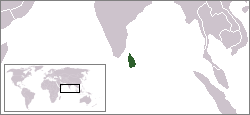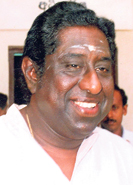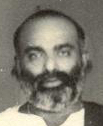
All Ceylon Tamil Congress, is the oldest Tamil political party in Sri Lanka.

The Ceylon Workers' Congress (CWC) is a political party in Sri Lanka that has traditionally represented Sri Lankan Tamils of Indian origin working in the plantation sector of the economy.

Alfred Thangarajah Duraiappah was a Sri Lankan lawyer who served as Mayor of Jaffna from 1970 until his assassination. He was also a Member of Parliament for Jaffna from 1960 to 1965. Duraiappah was killed by the Liberation Tigers of Tamil Eelam.

Ganapathipillai Gangaser Ponnambalam was a Ceylon Tamil lawyer, politician and cabinet minister. He was the founder and leader of the All Ceylon Tamil Congress (ACTC), the first political party to represent the Ceylon Tamils.

The Sri Lankan state has been accused of state terrorism against the Tamil minority as well as the Sinhalese majority, during the two Marxist–Leninist insurrections. The Sri Lankan government and the Sri Lankan Armed Forces have been charged with massacres, indiscriminate shelling and bombing, extrajudicial killings, rape, torture, disappearance, arbitrary detention, forced displacement and economic blockade. According to Amnesty International, state terror was institutionalized into Sri Lanka's laws, government and society.

The 1977 anti-Tamil pogrom in Sri Lanka followed the 1977 general elections in Sri Lanka where the Sri Lankan Tamil nationalistic Tamil United Liberation Front won a plurality of minority Sri Lankan Tamil votes. In the elections, the party stood for secession. An official government estimate put the death toll at 125, whereas other sources estimate that around 300 Tamils were killed by Sinhalese mobs. Human rights groups, such as the UTHR-J, accused the newly elected UNP-led government of orchestrating the violence.

Samuel James Veluppillai Chelvanayakam was a Ceylonese lawyer, politician and Member of Parliament. He was the founder and leader of the Illankai Tamil Arasu Kachchi (ITAK) and Tamil United Liberation Front (TULF) and a political leader of the Ceylon Tamil community for more than two decades. Chelvanayakam has been described as a father figure to Ceylon's Tamils, to whom he was known as "Thanthai Chelva".
The origins of the Sri Lankan Civil War lie in the continuous political rancor between the majority Sinhalese and the minority Sri Lankan Tamils. The war has been described by social anthropologist Jonathan Spencer as an outcome of how modern ethnic identities have been made and re-made since the colonial period, with the political struggle between minority Tamils and the Sinhalese-dominant government accompanied by rhetorical wars over archeological sites and place name etymologies, and the political use of the national past.

Tamil Eelam is a proposed independent state that many Tamils in Sri Lanka and the Eelam Tamil diaspora aspire to create in the north and east of Sri Lanka. Large sections of the North-East were under de facto control of the Liberation Tigers of Tamil Eelam (LTTE) for most of the 1990s–2000s during the Sri Lankan Civil War. Tamil Eelam, although encompassing the traditional homelands of Eelam Tamils, does not have official status or recognition by world states. The name is derived from the ancient Tamil name for Sri Lanka, Eelam.

Gaasinather Gangaser Ponnambalam was a Sri Lankan lawyer and politician. Leader of the All Ceylon Tamil Congress, he was the party's presidential candidate in 1982. He was shot dead on 5 January 2000 in an assassination many suspect to be ordered by President Chandrika Kumaratunga.
Sri Lankan Vellalar is a caste in Sri Lanka, predominantly found in the Jaffna peninsula and adjacent Vanni region, who comprise about half of the Sri Lankan Tamil population. They were traditionally involved in agriculture, but also included merchants, landowners and temple patrons. They also form part of the Sri Lankan Tamil diaspora.
Sri Lankan Tamil nationalism is the conviction of the Sri Lankan Tamil people, a minority ethnic group in the South Asian island country of Sri Lanka, that they have the right to constitute an independent or autonomous political community. This idea has not always existed. Sri Lankan Tamil national awareness began during the era of British rule during the nineteenth century, as Tamil Hindu revivalists tried to counter Protestant missionary activity. The revivalists, led by Arumuga Navalar, used literacy as a tool to spread Hinduism and its principles.

Elangai Murugesu Vijayaretnam Naganathan was a Ceylon Tamil physician, politician, senator and Member of Parliament.

Vaithianathan Navaratnam was a Sri Lankan Tamil lawyer, politician and Member of Parliament.

Vallipuram Nallathamby Navaratnam was a Sri Lankan Tamil lawyer, politician and Member of Parliament.

Ilankai Tamil Arasu Kachchi is a Sri Lankan political party which represents the Sri Lankan Tamil minority in the country. It was originally founded in 1949 as a breakaway faction of the All Ceylon Tamil Congress (ACTC). In 1972, ITAK merged with the ACTC and Ceylon Workers' Congress (CWC) to form the Tamil United Front, which later changed its name to the Tamil United Liberation Front (TULF). ITAK remained dormant until 2004 when a split in the TULF resulted in ITAK being re-established as an active political party. ITAK was the main constituent party of the Tamil National Alliance from 2004 until its dissolution in 2024. As of 2024, the party is the largest Tamil party in Parliament and the third-largest overall, after the National People's Power and the Samagi Jana Balawegaya.
The Vaddukoddai Resolution was adopted on May 14, 1976, in Pannakam, near Vaddukoddai, Northern Province, Sri Lanka. It called for the creation of an independent Tamil Eelam by the Tamil United Liberation Front under the leadership of S. J. V. Chelvanayakam. It was a major event in the modern history of Sri Lanka, as it was the first time the demand for a separate state for the Sri Lankan Tamils was made; Tamils had previously only demanded devolution or power sharing under a federal system. TULF contested the 1977 Sri Lankan parliamentary election on its demand for Tamil Eelam and won an overwhelming mandate in the Tamil areas, becoming the main opposition party in Sri Lanka, the only time a minority party has done so. It gave impetus to Tamil nationalists, who claimed it was a democratic endorsement of a separate state.
Cyrillus Xavier Martyn was a Sri Lankan Tamil politician and Member of Parliament.

Vallipuram Ponnambalam was a Sri Lankan Tamil politician and teacher. He was a prominent leader of the left-wing in northern Sri Lanka. He served as the secretary of the Jaffna District Committee of the Communist Party of Ceylon. Ponnambalam was noted for his 'clean image' as a political leader.
Jaganathan Tyagaraja was a Ceylon Tamil barrister, politician and member of the State Council of Ceylon.













